#your essay just made me think a lot about galvatron
Explore tagged Tumblr posts
Text
I was going to put my thoughts in the tags, but I ended up having too many of them.
I want to start by saying that this is a fantastic essay that delves into Galvatron's personality. It's made my own brain race all day and I had to puke out all my thoughts on it.
If anyone wants to send me asks or messages about Galvatron, I could talk all day about him non-stop.
The connection between Straxus, Megatron, and Galvatron is something I'd never considered before and it's incredibly fascinating, but it opens a can of worms you don't properly address, which is a shame because they primarily support your final take.
Firstly, you start the essay with Galvatron II restating his backstory for us, and he identifies the flaw in the jewel that is himself as Megatron. Notably, the Megatron-Ratchet merge had already happened and Megatron is suffering mentally from it, and that is directly linked to what Galvatron thinks is wrong with himself. If people that have had an influence on Megatron's mind and body also influence Galvatron's mind and body, it's reasonable to assume that Ratchet is also in the mix here. The fact that you don't mention it further in the essay seems like a huge missed opportunity as it could provide further weight to your conclusion that Galvatron is different from Megatron, and could potentially live peacefully.
The second missed opportunity surrounds Galvatron's second alt mode, which is a handheld laser pistol, that is extremely similar to Megatron's. If Galvatron's cannon alt-mode represents Straxus and his influence, the pistol very clearly represents Megatron. How Galvatron uses his second alt mode is extremely telling of how he thinks of Megatron. Namely, Galvatron II and cartoon Galvatron (who you completely dismiss during your essay) don't use their pistol alt mode at all. This is symbolically both a rejection of Megatron and a rejection of subservience. The rejection of Megatron is realized in ways that you've mentioned, like not searching out Megatron for a partnership, or leaving out information in Target: 2006 so they don't form an allyship. Megatron was willing to literally put himself into someone else's hands to be used as a weapon, and Galvatron doesn't even consider it. In the comics Galvatron uses his secondary alt mode three times. Once in order to ride in Cyclonus' cockpit similarly to how Megatron does, once in order to hide from the Autobots in a city, and once he allows himself to be held by a human. This last moment is particularly notable as it is the only time he's been held, and it was by someone who he was actively threatening and had the upper hand against. Galvatron, primarily, needs to feel like he's in control of his life, but that's something I'd like to go further into in my own essay.
Onto the next part, your observation that Galvatron knows the names of the nobody characters and keeps them alive because he relates to them is what lessened by the fact that Galvatron is time traveling back in time. There are very few people Galvatron can safely kill, and he only starts murdering tons of people after space-time starts collapsing and messing with his memory and perception of reality.
On that note, I had also noticed that Galvatron treated fights with characters that might be able to beat him, and fights with characters that absolutely can't defeat him extremely differently. I agree that Galvatron is afraid of losing, he almost reminds me of how skilled chess sometimes play against skilled vs unskilled players. Against other skilled players (when not in tournaments) they may heckle and play mind games, and generally be very vocal in order to distract or trip up their opponents. Against less skilled players they don't need to do all that since they know they'll win. And this is extremely similar to how Galvatron acts in different fights, against Ultra Magnus he is extremely vocal, but when against weaker enemies he's much quieter on average. Added onto this, Galvatron, the handful of times he's been defeated in a fight, seems to just shut down for awhile- in #161 after being defeated by Magnus Galvatron just sorta limps away quietly, and other times when he's dunked in water or plasma or something he'll just stay there for however long it takes for someone to find him. I imagine this relates to your notion that Galvatron doesn't handle cognitive dissonance very well. In his mind he is the strongest, and when he's defeated that sort of breaks his sense of self until he can repair it.
Something in your conclusion that I very much agree with is that Galvatron doesn't want to conquer and, additionally, he doesn't want to lead. Galvatron II stated he'd be perfectly happy if all the Transformers dropped dead, and cartoon Galvatron considered all his Decepticons cannon fodder, nothing more than bodies to be thrown at his enemies. All versions of Galvatron appear to lead the Decepticons purely because it's useful to have a bunch of people doing his bidding, but he seems to hate it and all of them while he's leading. So while I think that he wouldn't be happy conquering or leading, he would be happy constantly fighting and terrorizing beings that are weaker than him- because he needs to feel powerful and in control. But that doesn't mean I don't think he also couldn't be happy doing something else instead. If he were to settle down, so to speak, I think he'd make a good artist. I'm not going to elaborate on that now, though, that's for the essay I want to write but never will.
TL;DR: I loved the essay op, it dives deep into Galvatron's actions and psyche and draws conclusion that most people wouldn't think of. I'm definitely integrating some of this- esp the Straxus stuff- into my perception of Galvatron.
Essay: Galvatron, the Flawed Jewel
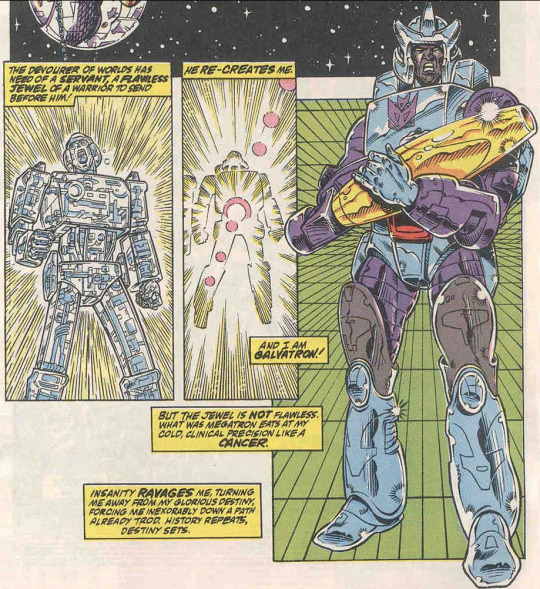
When I watched the 80s Sunbow cartoon, I always found Galvatron to be a rather shallow character. But in the Marvel UK comics, he is one of the most fascinating and compelling of all. I want to explore why that is. However, before I can, I need to briefly clarify who Galvatron was made from and how many versions of him are in this continuity. Time-travel makes this really complicated, but here's my best guess:
The first Galvatron (and Scourge and Cyclonus) went back in time right after he was thrown out of Unicron by Rodimus as he was in the movie. This Galvatron went back in time to escape from and find a way to destroy Unicron, but he, Cyclonus, and Scourge end up being erased from existence in the Time Wars arc after Shockwave kills Cyclonus, accidentally causing the space-time continuum to nearly collapse.
Galvatron II was plucked from an alternate future in which he tried to get Unicron to leave him alone by doing his bidding—killing and conquering. But the Unicron of the main timeline makes Galvatron II do yet more labor for him.
A third Galvatron was shown in the future stories, replacing the one who was erased from existence. This Galvatron temporarily succeeds in forcing the future Autobots off Cybertron, but ends up dead (maybe? He's shown slumped in a pile of corpses so) in a battle against Unicron.
I'm going to assume each Galvatron can be used to inform my interpretation of him in general.
Another detail to mention is that the Galvatron(s) of this continuity were always made from more than Megatron. All of them probably have some degree of Straxus in them as well. Straxus, who I must say sure is obsessed with Megatron's body, both injected his mind into Megatron AND built a second, lookalike Megatron out of some unnamed Decepticon to inject his mind into. In both cases, Megatron's personality seemed to reemerge as the dominant one, but this calls into question what Galvaton inherited from whom.
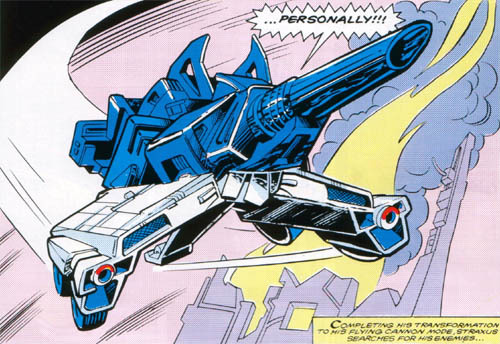
Straxus's alt-mode, which seems very similar to Galvatron's
With all of that out of the way, time to delve into the complexities of Galvatron's characterization!
One of the first things that surprised me about Galvatron in this continuity was the way he reacts to characters who are obscure and/or weak.

He knows all their names!
One big issue with this continuity is the overinflated cast (because the comic was supposed to sell the toys), so there were always tons of characters who almost felt like filler running around. A few characters who are known for their cool designs and toys, but still fill this role, are the Seacons. They're just described as engineers who were brought to Earth to fortify Shockwave's undersea base, not to fight. But when Shockwave sees Galvatron walking around on the ocean floor, he sends them out to fight him against Soundwave's advice, knowing they'll probably die. The Seacons' leader, Snap Trap, even just tells his team, "...do your best!" before the fight, which doesn't inspire confidence lol
But Galvatron is impressed with them, and even leaves them all alive! He says that by embarrassing Shockwave, it will all be in their best interest one day.


Some way too overexposed filler characters were the Sparklers/Sparkabots. When one of them, Fizzle, almost drowns, Galvatron... saves him for seemingly no reason?
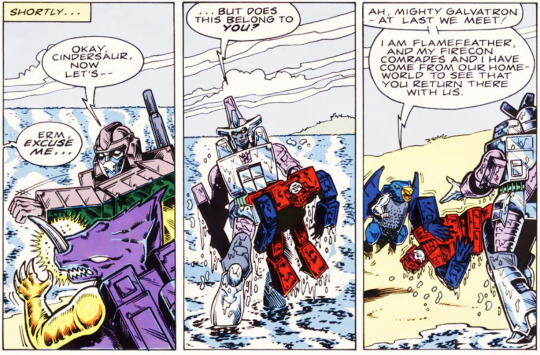
At the same time, though, I think it's significant that this odd fondness does seem be predicated on these people not actually being able to do much to him or anybody close to his level. For example, several characters I'd classify as being on the level of fodder, Guzzle (another Sparkabot), Getaway, Chainclaw, and Crossblades are initially some of the only surviving Autobots in the future Galvatron II was from, but when they actually manage to defeat Scourge and Cyclonus, Galvatron is so disgusted that he saves Cyclonus's life just to immediately punish him by killing him himself.

When it comes to the big names, Galvatron seems to feel only contempt. In Galvatron II's future, he strings up Rodimus's corpse and shoots him again and again, symbolically killing him over and over. And in the multi-issue story ...Perchance to Dream in which Galvatron tries to trap various Autobots who are in stasis in visions of moments in which they demonstrated their inner weaknesses/flaws, we get to see Galvatron's own nightmare. While it's meant to be humorous, I think the fact that Galvatron's worst fear is being killed by Rodimus over and over again is important.

In fact, it's not just the Prime I suspect Galvatron is afraid of. Sure, maybe it was just cruelty or his desire to turn the Decepticons against the Autobots, but in the Time Wars arc, I think he used Scorponok as a shield because he didn't want to face Ultra Magnus in a fair fight, since Magnus had previously defeated Galvatron a couple of times.

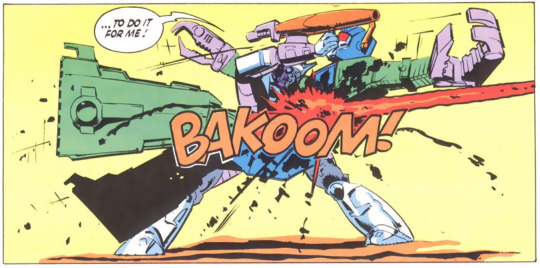
So, Galvatron's afraid of other people who can best him, but what does he desire? Well, the entire series follows his mission to free himself of Unicron. He has major setbacks given multiple versions of himself die, and Galvatron II suffered a rude awakening when he realized his attempt to satisfy Unicron by following his orders was for naught and that that he remained a tool. In fact, I believe that Galvatron's interest in weak, obscure characters stems from how eclipsed he himself feels by Unicron.
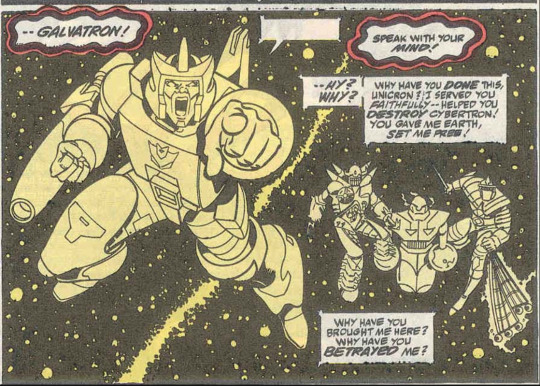

Also, I love how much of Unicron's and Primus's personalities we get to see in these comics. Unicron is so immature which is great, because like, who does he have to impress? XD
Galvatron sometimes says he wants to take over the Decepticons and conquer the world when he's free of Unicron, but I honestly question if that's even true. Galvatron II doesn't spread his "empire" beyond the Americas, something that bothers his troops. They note he's acting like a child, revelling in random acts of destruction to no purpose.
The first Galvatron spent a long stretch of issues (like a hundred or so IIRC) in the present time, wandering around and doing nothing in particular, only lashing out when he's reminded of Rodimus Prime, or attacked by other people, like his former lieutenants Scourge and Cyclonus, or the Wreckers. All of that on top of the fact that he very intentionally didn't start his fight with the Seacons... in fact, after that battle, he embarrasses Shockwave and undermines his command by claiming he'd come in peace. Galvatron also doesn't really take initiative to team up with his old self, Megatron, instead only doing so after Shockwave attempts to get over that humiliation by using Megatron as a weapon against Galvatron. And yes, then he finally starts to take initiative and battle people... but I almost wonder if that was Megatron's drive for conquest propelling the initial conflict, not Galvatron's.
This brings up another really interesting facet of Galvatron's character: his relationship with Megatron. In the story arc that introduced Galvatron, Target: 2006, his initial plan is to get Megatron's help in building a weapon to destroy Unicron. Notably, Galvatron does not tell him they are one and the same, and unsurprisingly, Megatron does not agree to work with him.
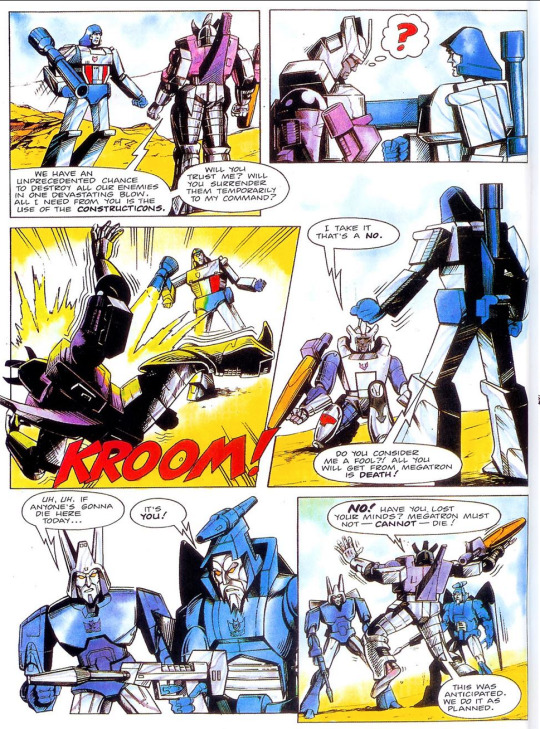
However, some time after incapacitating Megatron, Galvatron does tell the captured Jazz about his entire backstory. Also, the first ever glimpse of Galvatron's unstable state of mind came when Megatron decided to team up with the Autobots to defeat him. He can't seem to handle the cognitive dissonance of this.
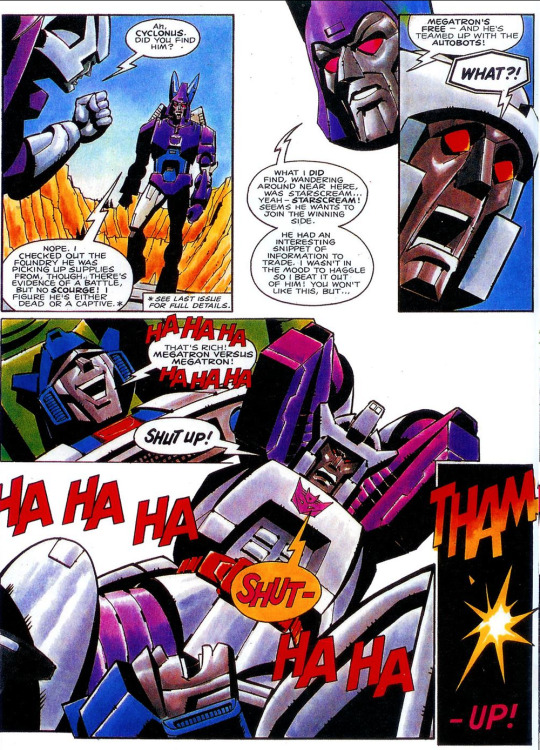
Later, leading up the Time Wars arc, Galvatron does manage to get Megatron's assistance by instead convincing him they're the same. One of the first moments that peaked my interest in Galvatron was during this arc. When he sees the Wrecker, Roadbuster, about to shoot Megatron, and remembers that in his timeline, he suffered that injury as Megatron. And in that moment, Galvatron decides to spare his past self the pain.
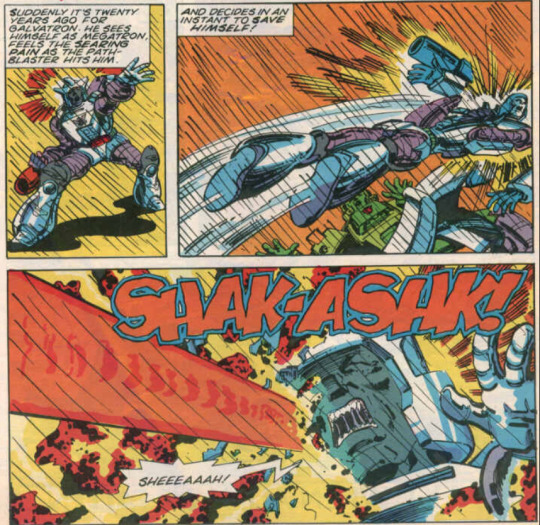
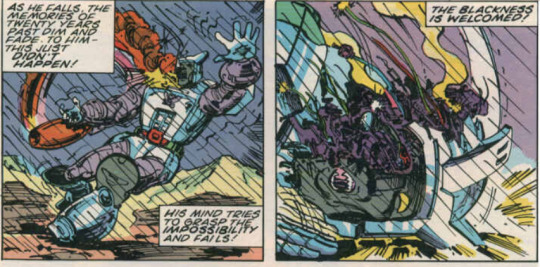
There are so many layers to this. Imagine remembering horrible pain that your past self suffered and then deciding to suffer that as your current self to spare them that agony. It's not a selfish act, because you still have to feel it. It's bizarrely compassionate in a way. (It's also worth noting that as the timeline diverges more and more from his original one, Galvatron becomes more and more unstable, to the point that even Megatron grows tired of his madness and vows to not end up like him. Once again, something about cognitive dissonance is extremely difficult for Galvatron to handle).
Unlike this Galvatron, Galvatron II initially resents Megatron. Galvatron II actually manages to best Unicron by making Emirate Xaaron wake Primus to get the god's help (!) and then inspiring all the Autobots and Decepticons to fight Unicron (!!!) and eventually Unicron is destroyed.

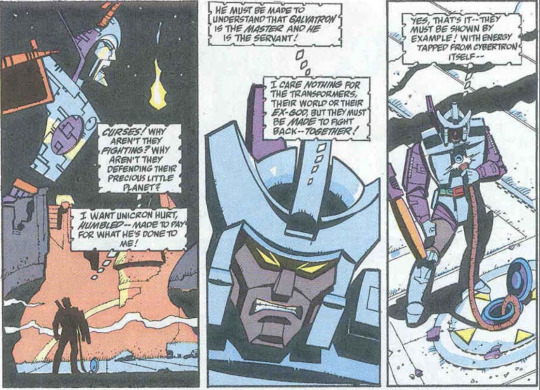

Galvatron in this continuity is such a badass, I really can't overstate that
But with Unicron gone, Galvatron then sees Megatron as the one thing still holding him back. This is where the header image of this post comes from: Galvatron views Megatron as the flaw to his otherwise-perfect jewel. When Galvatron sneaks aboard the Ark, which Shockwave and Starscream have stolen, and discovers Megatron there, Galvatron blames Megatron for his mental instability. He nearly tries to kill him before he comes to his senses and snaps back to an attitude more like that of the first Galvatron and decides he might need to protect Megatron and team up with him.
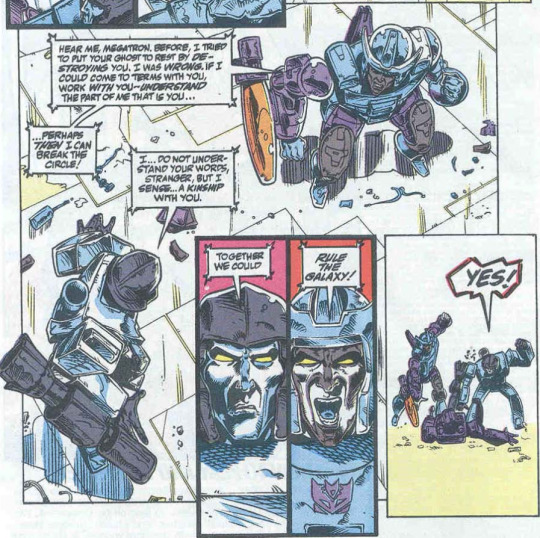
This is the (not Straxus-made clone) version of Megatron and Galvatron II, who hadn't met before this point
However, this isn't to be. The Ark crashes when Ratchet sacrifices himself and only Galvatron is seen leaving it. He kills some humans and then unsteadily walks away from the ship, until he ends up at a settlement.

He ends up being tracked down by Fortress Maximus, who shoots him in the back, which triggers Galvatron and causes him to go into a rabid frenzy.
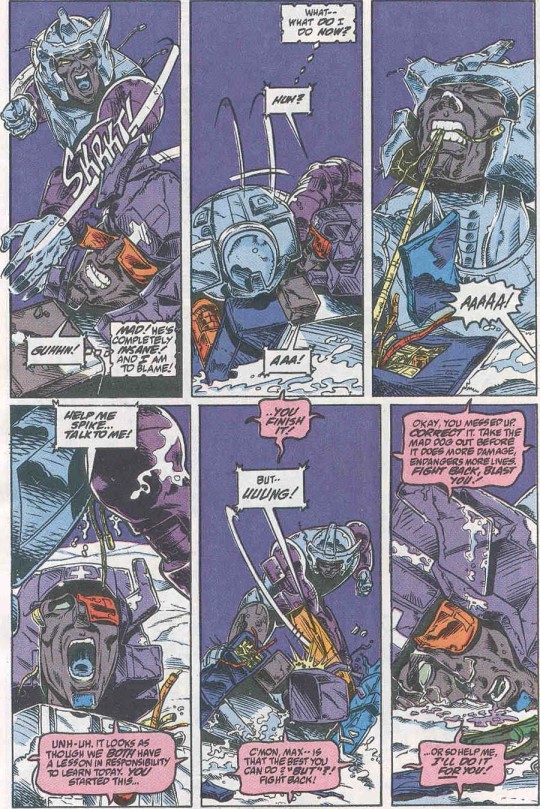
Pictured: Galvatron eating the forbidden noodles
Fortress Maximus beats himself up over causing this for a while until his Headmaster component, Spike Witwicky, tells him to own up to his mistake and fix it.
I want to shift focus for a minute to this final opponent Galvatron ends up facing. Fortress Maximus in this series is an extremely flawed Autobot: so worn-down and eager to stop fighting and have peace that he ended up essentially being a colonialist whose actions and inaction nearly destroy a once-peaceful world. He's a character who is super averse to conflict to the point of being callous at points, and he needed to learn to do his duty and take responsibility for his actions. I mention him because I think Galvatron is a parallel inversion of those character traits: what he actually needs is to just stop fighting, since it's when he isn't that he is actually at his most stable... but that need is getting obscured by his immense power, arrogance, and mental illness.
This conclusion may be reaching, but here is my ultimate take on Galvatron's character here: Galvatron's past self, Megatron, is someone with an indomitable will. No matter how embarrassing the defeat (and he has so many humiliating ones in this continuity, from standing on a cliff that falls out from under him, to freezing up because he was hangry and ate too much raw coal), he keeps going seemingly shamelessly. No matter how many times people like Straxus and Shockwave try to take over his mind, Megatron's personality just keeps reasserting itself in the end. He gets inappropriately intimate with his enemies, and just become more driven and more obsessed if anyone ever manages to get the better of him. He lives to fight, and enjoyed executing people before he ever started the War.
But I think Galvatron is not only a transformed Megatron (+ whoever else was sharing Megatron's head at the time), but a transformed Megatron whose will was shattered by Unicron. That deep down, Galvatron doesn't particularly want to keep fighting and conquering—that he's not at his happiest when he's fighting and killing some powerful opponent the way Megatron is. Instead, fights with people who could threaten him scare him. He doesn't even really care that much about conquering the world... the passion that Megatron had for being a dictatorial strongman is all but gone. Galvatron seemed most satisfied when he was just hanging around on Earth, doing nothing in particular, maybe in a body of water or something, alone, with nobody around to trigger memories of Rodimus Prime or Unicron or anyone else powerful enough to hurt him. Hot take, but I feel like with Galvatron, there could be a chance that he could be open to living peacefully if he were left alone, which is something I didn't feel was possible with Megatron.
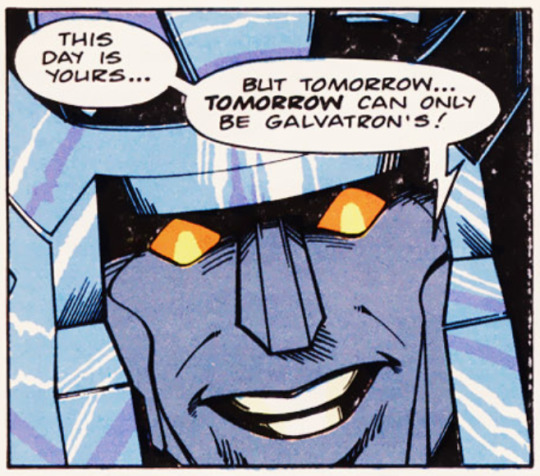
...Also, this color scheme for Galvatron is the best ever. Just saying!
#galvatron#excellent essay#even if i didnt entirely agree with the conclusion i mostly agreed with it#ignore everything i wrote that sounds like criticism#your essay just made me think a lot about galvatron#analysis#tf meta
82 notes
·
View notes
Text
Ghost Season Working Pt 1/7

Introduction
Welcome to the Ghost Season Working!
This 63-day journey will guide you on a mythic underworld quest that mirrors Starscream’s quest to regain his physical body in the Transformers episode, Ghost in the Machine. The ritual’s purpose is to bring about a ‘resurrection’ in a specific area of your own life.
No, that doesn’t mean literally bringing anyone back from the dead (sorry!). Instead, the ritual’s magical intent is to release whatever is blocking your success in a particular area of your life, as chosen by you, and to bring about a deep healing and transformation of that particular aspect of your life.
Before I continue, one quick caveat: This is an occult ritual. No, we won’t be doing anything 'evil.' No demons will be summoned, no hexes cast, and no furry creatures will be harmed. If you undertake this journey, however, you will be working some magick. With a ‘k.’
If that sounds scary or doesn’t mesh with your worldview or personal religious outlook, this Working may not be for you. And that’s fine. Please don’t do anything that makes you uncomfortable. If you’re curious, though, read on!

What is Ghost Season?
Ghost Season is the period between August 22 (my hypothesized anniversary for Starscream’s death) and October 23 (my hypothesized anniversary for Starscream’s resurrection). If you’re curious as to my reasoning for choosing these dates, take a look at my essay, The Astrology of Starscream’s Death and Resurrection in G1.
Ghost Season is, for me, a time of inward reflection and self-transformation. The Ghost Season Working molds that theme of self-improvement into a 63-day (9 week) ritual in which each participant, or ‘Seeker,' works diligently through means both magical and mundane to bring about a desired change in a particular area of their life.
Did I say… work?
Oh yes, I sure did. When Starscream made his pact with Unicron in Ghost In The Machine, the Dark God demanded three Labors in exchange for restoring Starscream to physical life. We, too, must take on Labors in order to create healing and transformation in our own lives.
But, you might be thinking, isn’t this supposed to be magic? Why do I have to do anything? Shouldn’t magic do the work for me? Sorry, but no. That’s Hollywood’s idea of magic. You wave a wand, a pretty light-show appears, and poof! Your heart’s desire materializes before you in a cloud of smoke.
As fun as that would be, real-life magick is… quieter. Rarely will it make itself known in obvious ways. Instead, it will shift energies into alignment with your intent and arrange probabilities to work in your favor.
An example of real-life magick:
I used to have a nasty old car that broke down all the time. I was working as a pizza delivery driver at the time, and needed this car for my job. At the same time, I was spending more money keeping the car on the road than I was actually earning at the job.
One day, the car started acting up right after I’d just spent a bunch of money on it, and I snapped. I knew I was going to have to take it back to the mechanic and spend a bunch more money that I couldn’t afford. Before leaving, though, I cast a spell. I created a symbol (also called a sigil) representing my intention to become the kind of person whose car always runs well. I drew the symbol on my skin and rubbed it in with oil, infusing my intention into my body.
By the time I arrived at the garage, my coughing, spluttering car was running smoothly, and the mechanic couldn’t find anything wrong with it. The car continued to be reliable after that, and because I’d cast the spell on myself rather than on the car, my subsequent vehicles have also been very reliable.
Could this be explained by a mundane cause? Of course! In fact, I’m sure there is a mundane explanation. Does that make it any less magical? Some might think so, but I disagree. I believe that it shows that our physical world holds far more than meets the eye. It is infused with magick. Matter and magick are not separate, but are in fact two manifestations of the same energy.
When you do magick, you engage with the natural forces of the universe. By aligning with them and enlisting their cooperation, you begin to find yourself in the right place at the right time. You’ll meet people who can help you, or impart the skills you need in achieving your goal. You will get sudden rushes of creative inspiration, and the exact information or resource you needed will itself themselves in your path almost… as if… by magic.
But here’s the thing: you still have to do the work. You still have to apply for the job, write the novel, run the marathon, practice your musical instrument, or show up for class. All the magic in the world can’t do that part for you.
The good news, however, is that you don’t have to do the work by yourself.

Working With Starscream
You are not alone.
That it is the truly wonderful thing about this journey. I’m going to assume that if you’re considering embarking on the Ghost Season Working, you are probably a Starscream fan. Or, at least, interested in becoming one. I’ll say right now that one of the things I’ve always admired about Starscream is his sheer, stubborn determination to get what he wants.
Starscream is crafty, resourceful, and above all determined. If at first he doesn’t succeed, he tries something else. And something else again, if that doesn’t work. I’ve written a whole essay about this in relation to his search for Skyfire, and as any Transformers fan knows, Starscream’s attempts to wrest leadership of the Decepticons from Megatron’s grasp are legendary.
When Unicron demanded three labors from Starscream in exchange for restoring his physical body, Starscream’s immediate response was: “Only three? Name them!” He didn’t allow himself to become Unicron’s slave the way Galvatron had, but he also didn’t flinch from doing what needed to be done. In the end, he got his body back—through magic, yes—but first he had to do the work.
By entering into the Ghost Season Working, you are aligning your quest for self-transformation with Staracream’s underworld journey. In doing so, you become his ally and his companion, and, in a very real sense, he becomes yours. I can personally attest that he is a wonderful guide and companion, and I’m very excited to have this opportunity to show others how they, too, can engage with him on a spiritual level if they so choose.
Want to know more? See Part Two for a Ritual Overview.
___________
Note: Yes, I’ve been posting a lot lately. If you were wondering if this sudden flurry of activity was leading up to something, why yes! Here it is. I’ve been wanting to create a proper ritual for Ghost Season for ages, and now I’ve finally gathered my thoughts and materials together to create one. I will be posting this at Archive of Our Own, too, so if you would like a downloadable e-book version of the ritual, plus supporting appendices, it will be available there. Sort of a “grimoire edition.” Here’s the link: Ritual: The Ghost Season Working
#starscream#starscream spirit guide#starscream's ghost#ghost season#pop culture magick#pop culture spirituality#pop culture paganism#pop culture spirit guides#ghost season working
4 notes
·
View notes
Text
Wait this is kind of a banger idea. And this is also going to end up as another rant glazing Scourge, but guys, hear me out. Because the matrix didn’t give Galvatron powers when he stuck it in his cannon, and it didn’t yield to Ultra Magnus either. Sure some argument could be made that neither placed it in their chest but guys bear with me
In G1, the Matrix doesn't specify requiring an Autobot wielder: Optimus Prime only has the prophecy that names Hot Rod the next leader, and all the primes past being Autobots could also be attributed to Autobots being the dominant political power until the start of the war as we knew it. And the Matrix wasn't necessarily made for the Autobots- its origins seeming to predate the Autobots themselves (according to TFwiki, I think.)
And given that both Optimus and Rodimus (hot rod) can be alive at once (after OP’s proper resurrection and brief stint in Headmasters), we could imply that more than one living bot can be worthy of the Matrix at a time. Outside of the prophecy, Orion Pax was a dock worker who just happened to be brought to Alpha Trion when he first received it. And it's not exactly statistically likely that the Matrix always has one singular "chosen one" for it to fall into the hands of when the current bearer dies (sure, yes, the argument could be made for it supernaturally finding its way into the next "chosen one" with all the prophecy/fate bs, but that's not as fun.) I mean, what if the next "chosen one" dies before their time, or is otherwise completely unable to receive it (say incapacitated, across the galaxy, imprisoned, etc.) They'd be screwed!
Therefore, having multiple bots with the trait of 'worthiness' would make sense. Maybe uncommon, but it's better than having one singular guy being able to wield the damn thing per generation. And given this and its predation of the Autobot/Decepticon kind, why would it rule out the Decepticons, who are also Transformers that could potentially wield the Matrix? They might be military hardware, but still Cybertronian.
Which now rules in the possibility of some of our S3 Decepticons being "worthy'". Which includes Scourge, but excludes Galvatron (who is already seen to not be able to use it.)
This is where things get tricky- because these guys were reformatted by Unicron. While they're still probably (canonically) Cybertronian, whatever Unicron did to fix them + give them power boosts has had to turn them slightly Unicron-ish in some capacity since that guy kind of altered their entire bodies and memories and crap. Now being built by Unicron, who famously exploded when the Matrix opened inside of him, we can assume all of the S3 high command is effectively also allergic to Matrix energy, explaining the weird warping that happened to Scourge when he used the Matrix.
The question is now whether this sort of reformatting removes the "worthy" trait from the mech being changed, or if it's a trait that you build with your character. If the former, it could imply that Thundercracker might've been able to wield the Matrix, had he not died. If it's the latter, which is slightly more interesting, it implies Scourge somehow is noble and good enough to be a Matrix-bearer by some virtue of his character.
Which admittedly there isn't too much to argue for, but we can tack on "is a good leader to the Sweeps" (dubious), and "free thinker despite his orders" (which I already did a rant on, but to summarize- openly disobeys Galvatron's order to destroy Matrix, helped save Cybertron from becoming Unicron's new body, both of which he was created to serve originally). Which isn't a lot to work with, but given that Hot Rod, the guy who absolutely is not the stunning image of "noble, well-adjusted leader Prime" has the matrix- and was quite happy to lose it for a bit in the same episode Scourge picked it up- I figure it's a start!
And that is my essay about why Scourge is awesome and should've definitely become the next Prime or something, though maybe he's going to need some antihistamines for all that given the whole Unicron-allergic thing. But also, the Matrix is an interesting thing, and who is and isn't allowed to wield it is also interesting and should be talked about.
Thanks for coming to my TED talk I guess
wait. it's called the Matrix of Leadership. not the Matrix of Good Guy. maybe the reason it gave Scourge powers in The Burden Hardest to Bear is bc he's a genuinely good leader to the Sweeps and it recognized that, but he got corrupted bc he's still, y'know, a bastard.
i can't think of anything to rlly support this but it makes sense in my head so it's what i'm going with
#sorry for commandeering your post op i just want to talk about scourge#analysis#scourge#the matrix of leadership#galvatron#rodimus prime#hot rod#optimus prime
7 notes
·
View notes